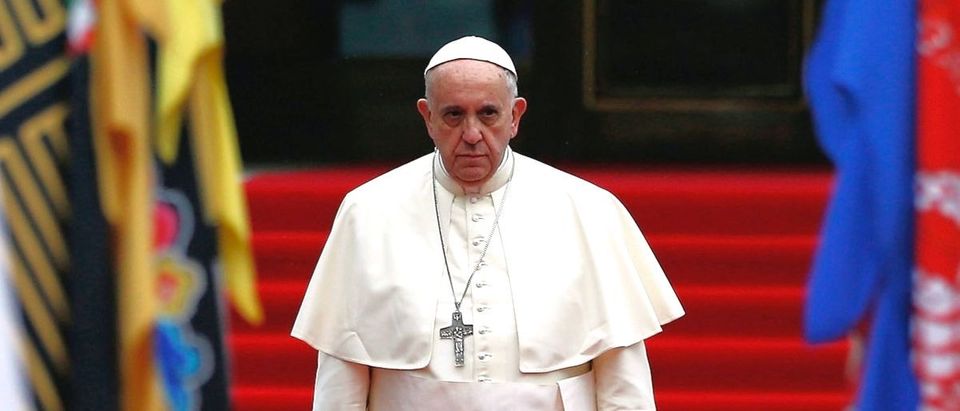A few days ago Pope Francis told the bishops of the Catholic Church that they need to be prepared to resign when the right time comes for them. He even said that he hoped he would know when the Holy Spirit wants him to resign, a remark that was taken as a hint (not the first he has given) that he intends to do so at some point. As we waited for a manifestation of this resolve, on 18 May we were given a dramatic sign. The entire Catholic hierarchy of Chile (all thirty-one active bishops, with three retired ones thrown in) have offered their resignation, supposedly because of failings in the handling of clerical sexual abuse in that country.
Any thought that this represents the new promptings of the Spirit would be off the mark. It is an effort to save face after the biggest public-relations blunder in Francis’s pontificate, the one he committed on January 18, when he defended Bishop Juan Barros against accusations of complicity in sexual abuse by the notorious Father Fernando Karadima in Chile. Pope Francis’s off-the-cuff pronouncements, which have earned him such popularity with the journalistic profession, on this occasion backfired on him. He declared that he had seen no proof of the sexual crimes alleged and that the accusations were slander. It was later demonstrated that Pope Francis had indeed seen the evidence, and he was dismissing the claims of victims who had been trying to gain justice for years.
The reason why this was such a disaster for Pope Francis was that, for the first time, it earned him criticism not only from such a senior figure as Cardinal O’Malley but from the liberal media, to whose applause he had been successfully playing for five years. A rescue operation was urgently needed. First of all, the Pope organised one of what may be called his “humility opportunities”, which he welcomes the way other celebrities like photo opportunities. There was a meeting with victims, and Pope Francis admitted his own failings; but this was nowhere near enough. To expiate his mistake, the Pope called all the Chilean bishops to Rome and told them — what? — that they were all to blame. One sentence from his rebuke is especially worth quoting: “No one can exempt himself and place the problem on the shoulders of the others” — a classic case of Francis’s frequent habit of denouncing other people for the faults of which he is the prime exemplar.
Pope Francis’s response to his predicament is in the honored tradition of Oliver Hardy: “Here’s another fine mess you’ve gotten me into.” The result? The whole Chilean hierarchy must resign to deflect attention from the Pope’s own error. The disproportion between the supposed cause and the effect defies all reason. The fact that a notorious priest (now 87) was molesting children in Chile 30 years ago is not a reason for Chilean bishops to resign now. Because the Pope made one wilfully bad episcopal appointment in 2015, that is no reason for the whole hierarchy to resign in 2018. The crisis is not that of the Chilean Church but the Pope’s. It was Pope Francis who insisted on appointing Barros bishop of Osorno in the face of protests; it was Pope Francis who shortly afterwards accused the people of Osorno of stupidity for opposing the appointment; it was Pope Francis who incurred the unpopularity that was displayed on his official visit to Chile in January 2018 (a fiasco that was attributed to “bad communication”); it was Pope Francis who chose to make his abrasive remarks to journalists on January 18 (and repeated them in substance on a papal plane journey three days later); it was Pope Francis against whom the media turned for his insensitivity. More, his faux pas was indeed due in part to misinformation, as he has pleaded; but the man chiefly responsible for that misinformation is the domineering ex-archbishop of Santiago, Cardinal Errázuriz, who was Father Karadima’s most adamant defender, even going so far as to describe him as a saint. And Cardinal Errázuriz is the man whom Pope Francis chose (at the sprightly age of 80, curiously enough) to be a member of the C9, the council of cardinals who are supposed to be planning the reform of the Church.
A number of questions are prompted by this business. For example, does Pope Francis hold himself responsible for his bad appointments and his bad judgment? And what sort of a regime is it in which an entire national hierarchy have to fall on their swords to save their boss’s face? Historic despots like Napoleon and Stalin were famous for their callous disregard of their soldiers’ lives in pursuit of their ends. Talking of Stalin, he is also known for his question, “How many divisions has the Pope?”, and we may extend it to ask how many other Catholic bishops and cardinals will be prepared to be Pope Francis’s cannon fodder, to practice self-immolation to keep their leader’s image from harm. Not as many as Pope Francis would like, I imagine; but at least they know now exactly what their leader expects of them.
This brings us back to the question of episcopal resignation with which this article opened. Will Pope Francis retire? He’ll see the whole hierarchy perish first.
Vatican insider and historian Henry Sire is the author of The Dictator Pope: The Inside Story of the Francis Papacy (Regnery Publishing).
The views and opinions expressed in this commentary are those of the author and do not reflect the official position of The Daily Caller.


